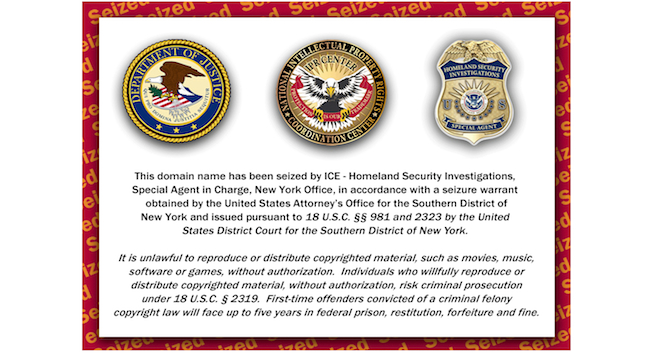The nation’s two major political parties may not agree about much of anything these days, but legislators from both parties do agree on one thing: Online Piracy Is Bad. And the government needs to have more power to be able to crack down on it.
So they’re working on legislation to officially sanction the civil forfeiture of domain names of web sites that law enforcement authorities suspect are helping people to easily access counterfeit goods and pirated content. The legislation would also require “service providers” to the operators of the suspect web sites to cut off service, just as Mastercard and Visa did to Wikileaks.
This week, House Judiciary Committee Chairman Lamar Smith (R-TX), ranking member John Conyers (D-MI), Reps. Bob Goodlatte (R-VA) and Howard Berman (D-CA) teamed up to introduce the Stop Online Piracy Act (SOPA.)
The legislation, which has been under discussion for some time in policy circles in Washington, DC, is controversial to say the least. Key members of the architects of the original internet have said that the Senate version of the legislation would fundamentally undermine the way the internet works and digital civil libertarians charge that the legislation unconstitutionally limits free speech. The basic issue is that law enforcement authorities would be given the power to temporarily shut down web sites without first going through a full legal process to do so.
For his part, Smith touted his bill in a statement on Wednesday:
“The Stop Online Piracy Act helps stop the flow of revenue to rogue websites and ensures that the profits from American innovations go to American innovators. The bill prevents online thieves from selling counterfeit goods in the U.S., expands international protections for intellectual property, and protects American consumers from dangerous counterfeit products.”
Many digital rights organizations have noted that the legislation is a more sweeping version of the Senate Protect-IP bill, introduced this May by Senate Judiciary Committee Chairman Patrick Leahy (D-VT.) That bill is currently stalled after Sen. Ron Wyden (D-WY) placed a hold on it.
Leahy’s bill is a “sequel” to another piece of legislation, the Combating Online Infringement and Counterfeits Act, or COICA, which was introduced in 2010 but successfully blocked and killed by Wyden and other Senate Democrats.
All of the legislation proposed has called for an expansion of what the Immigrations and Customs Office has already been doing: Putting up a seizure notice on websites after rights owners, including large media industry organizations like the Motion Picture Association of America (MPAA) and the Recording Industry Association of America (RIAA), have filed piracy complaints.
It should be little surprise that the RIAA commended the new legislation, with CEO Cary Sherman issuing the following statement:
“This legislation is a first step towards a brighter day when these rogue offshore websites can no longer duck accountability under U.S. laws, all the while providing a critical boost to the marketplace for legal digital music services.
The Smith bill sensibly requires relevant parties to work together to address the collateral damage caused to everyone involved in legitimate online commerce and appropriately complements other voluntary efforts already underway.”
And some of the largest web sites would be subject to greater legal obligations as well, as the bill “would allow the attorney general to seek a[n]…order directed at search engines such as Google or Microsoft’s Bing, requiring them to block access to infringing sites via a direct hypertext link in their search results,” National Journal reported.
Executives at Silicon Valley companies once again rolled their eyes at the attempted power grab.
“As leading brands of the Internet, we strongly oppose offshore ‘rogue’ websites and share policymakers’ goal of combating online infringement of copyrights and trademarks.
However, we do not believe that the solution lies in regulating the Internet and comprising its stability and security,” said Markham Erickson, executive director of NetCoalition, which includes Google, Yahoo and Bloomberg among its members, the Hill reported.
Gary Shapiro, President and CEO of the Consumer Electronics Association, posted his thoughts at length at Forbes, writing in part,” the bill is so broadly written that, in theory, it would allow any copyright owner to shut down a legitimate retail website, such as Amazon or Best Buy, by alleging that one product being sold on the site could “enable or facilitate” an infringement. It could even allow any content owner to block access to the Patent Office website if it receives and posts a patent application for a product that is believed to use content without permission.”
“While I’m all for shutting down websites operated by criminal enterprises, not all websites used to facilitate crimes are guilty of wrongdoing. Imagine a user commits criminal copyright infringement using a foreign video sharing site similar to YouTube, but the site is unaware of the infringement. Since the site is “facilitating” criminal copyright infringement, albeit unknowingly, is it subject to the Stop Online Piracy Act? Who knows,” wrote Ryan Radia at the Technology Liberation Front, a libertarian Web analysis blog.
Some writers think the bill won’t be terribly effective in the first place, and will backfire on legal U.S. users.
“The scheme is largely targeted at foreign websites which do not recognize US law, and which therefore will often refuse to comply with takedown requests,” explained Nate Anderson at Ars Technica, adding, “the potential for abuse–even inadvertent abuse–here is astonishing, given the terrifically outsized stick with which content owners can now beat on suspected infringers.”
Internet engineers and digital rights organizations say that the bill creates as many or more security problems as it proposes to fix, namely in the sense that users will begin creating domain name system (DNS) workarounds to access those domains that have been seized by the government.
As the Electronic Frontier Foundation put it: “The government would be able to force ISPs and search engines to redirect or dump users’ attempts to reach certain websites’ URLs. In response, third parties will woo average users to alternative servers that offer access to the entire Internet (not just the newly censored U.S. version), which will create new computer security vulnerabilities as the reliability and universality of the DNS evaporates.”
Digital rights group Public Knowledge’s Deputy Legal Director Sherwin Siy has posted an explanatory video on the vulnerabilities that such workarounds create.
Plainly put, as one blog Hot Hardware wrote, “the bill has been criticized as an attempt to create the Great Firewall of America,” in reference to the Chinese Firewall used to censor explicit and politically objectionable content, though that too has been continually porous.
The first hearing on SOPA is scheduled for November 16.
Sarah Lai Stirland contributed reporting to this article.









